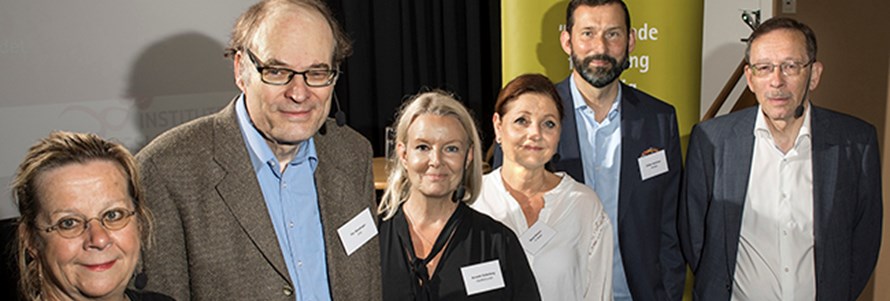
Lars Calmfors and Per Skedinger were interviewed by journalist Anna Danielsson Öberg about their new book. Photo: Bosse Johansson.
"Wage formation has always been seen as a problem for employment. And this is the case also today. Though, today the problem reads mainly low-educated and foreign-born," said Lars Calmfors at the seminar.
"It's a question about the basic conditions in the labor market. My members are the first in unemployment if the system fails. Therefore it is not possible to experiment and hope for the best," said Marie Nilsson, IF Metall, when a changed norm for wage setting was discussed.
She said that the Industry Agreement (Industriavtalet) creates stability and real wage increases for everyone.

Annelie Söderberg and Marie Nilsson. Photo: Bosse Johansson.
Also, Stefan Koskinen, Almega, praised today's model: "If you have a model that has been beneficial for employees, entrepreneurs, and the country at large, you should be careful when deciding to change it."

Marie Nilsson and Stefan Koskinen. Photo: Bosse Johansson.
Koskinen explained that we have to find ways to develop and modernize the collective agreements if we want to have our Swedish model also in the future, "which has so far served us well". Annelie Söderberg, the Swedish Association of Health Professionals, was not entirely positive to this stance. The entry salaries of the members of my union have admittedly increased, she said, but there have been hardly any increases in wages at all later in their careers.
"We cannot allow a lack of wage increases to affect the quality of care, and unfortunately, this is what happens today," said Söderberg.

Lars Calmfors and Annelie Söderberg. Photo: Bosse Johansson.
When the discussion was about whether the system in general needs to be reformed, Lars Calmfors said that "whichever risk is greatest: Is it changing the wage system or is it changing the system?"

It was a knowledgeable audience that attended the seminar at Medelhavsmuseet in Stockholm. Photo: Bosse Johansson.
Lars Calmfors suggested that a possible reform of the wage regulation is "that there should be an independent 'imbalance committee' appointed by the unions and the employers' organizations that can provide advice on major imbalances in the market." Several questions from the audience picked up on the imbalance committee and how it would function without creating major tensions in the labor market.
Recording from the seminar will be published HERE on June 14, 2019

